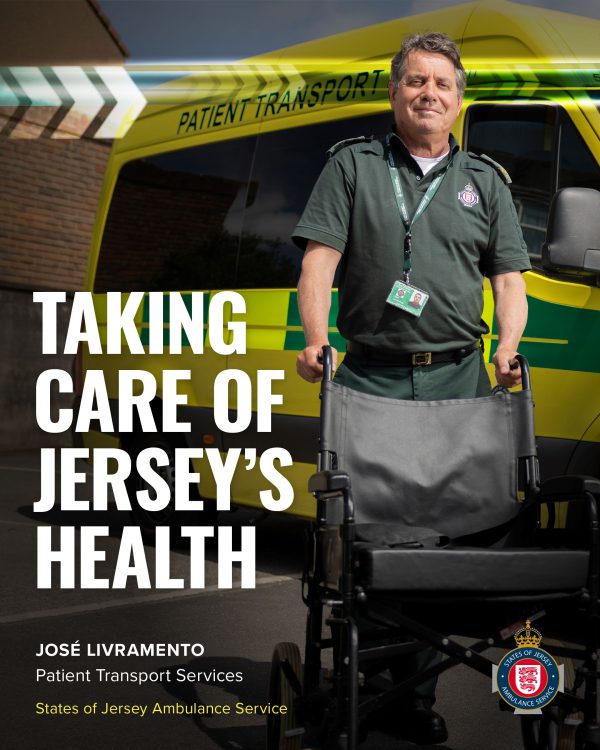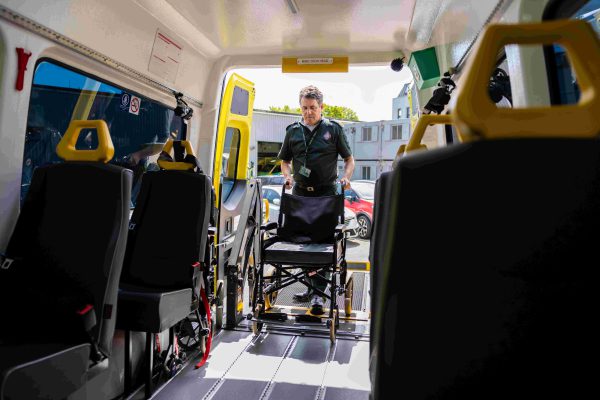
José Livramento has spent three decades working with members of the public in different sectors of society so taking a role with the Patient Transport Services (PTS) team was a natural move for him.
He was aware of the value and importance of the transport services offered to vulnerable members of the community and this was a motivation to apply for the position. He had previously been part of the COVID-19 response team as an administrator so had inside knowledge and experience of working for Health and Community Services and “was aware of the wonderful job the department does”.
The PTS team comprises 16 members with a fleet of 12 vehicles, which are fitted with specialist equipment for transporting patients using walking aids, wheelchairs and stretchers. As the name suggests, they are the non-emergency element of the States of Jersey Ambulance Service, responsible for transporting patients fitting the eligibility criteria to and from hospital appointments, day centres, palliative care and providing end of life transport and transport of patients on behalf of the Jersey Emergency Transfer Service (JETS) team to and from the airport. This supports Emergency and Urgent Care colleagues by enabling them to concentrate on responding to emergency calls.
José says that a typical day involves taking patients in need of transport from their homes or care homes to and from hospital.
As an Ambulance Care Assistant, the training includes first aid response, transporting patients in wheelchairs and on stretchers, the use of oxygen if necessary and also completing online courses to keep updated with new developments.
Previously people tended to specialise in one area and would only carry out those jobs. “We have taken on more stretcher jobs and the rotation on shifts has become more frequent. I really enjoy this because it means that the variety of work enables us to step into any role. I see this as a very positive move,” José explained.

“Although we work individually at
times, we all learn the same way. Teamwork is essential for delivering
our collective priority: the care and wellbeing of the patients”
“Although we work individually at times, we all learn the same way. Teamwork is essential for delivering our collective priority: the care and wellbeing of the patients,” he said.
He added that the most rewarding part of the job is when a patient expresses their thanks for the service provided. Those compliments are something that he hears often.
Driving for a living does come with its own challenges: “One of the most challenging aspects of the job is driving over uneven surfaces on roads and driveways, negotiating potholes and traffic calming measures, especially when I have patients with back injuries on board and they are in pain. Sometimes I need to drive very slowly and having impatient drivers behind really does not help.”
Although sometimes they may only spend the duration of one journey with a patient, being able to display empathy and be a good listener is important.
He recalled transporting a patient who was distressed having just been given a terminal diagnosis. “The person lived alone and was in a fragile state and very tearful. I tried to be more than just a driver and spent the trip comforting her. When we arrived at home she was calmer, squeezed my hand and gave me a smile.
“I felt I was able to offer support and pass on some positive energy.”
On other occasions, they can build up more of a rapport with patients who use patient transport regularly. “The motivation is to help other people and there is pride at the great job the whole of the Health Service delivers when you see the patients getting better. It leaves you with a good feeling at the end of a shift.”
José said the PTS team is small and compact and help and support each other in various ways, whether it be finding addresses or coming to the rescue if necessary.
“I would encourage people to come and work with us. It’s an important and rewarding job where no two days are the same and you meet lots of people from different backgrounds.
“I see myself as an older person and the experience I have gained over my lifetime puts me in a position where I can easily balance my work and my private life,” José explained.
“My hope is to be able to continue working for as long as I can in the health sector in Jersey, in any role I am capable of.”

 blog.gov.je
blog.gov.je